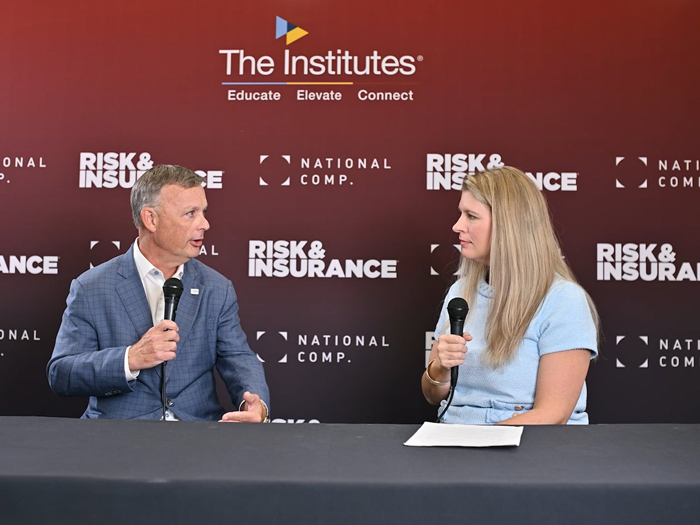Small Businesses Come in All Shapes, Sectors and Sizes. So Too, Do Their Exposures

When a small business experiences an accident, it may be the first time they’ve ever filed an insurance claim. They may have questions about the process or concerns about the cost.
“When you have those small entrepreneurs, oftentimes the claim that you’re handling is the first claim they’ve ever had. They’re not as well versed in insurance in the various coverages that they’ve purchased,” said John Watkins, senior vice president, claims global specialty at AmTrust.
Small businesses may be wary of turning to their insurance carriers with these questions and concerns — after all, won’t they be busy with larger companies? But carriers are exactly the risk management partner they need to keep individual claims from spiraling into litigation and to help them prevent accidents from occurring in the first place.
“There’s a level of service that a small company may traditionally think is not available to them because they’re not a big multinational,” said Andrew Morgan, executive vice president and global claims officer at AmTrust. “Small businesses today need to know they can get that same level of technical skill and service.”
In today’s challenging risk environment, small businesses may be worried about everything from workers’ comp and general liability concerns to inflationary pressures and cyber. Here’s a look at some of the risks they face and what they can do to mitigate their exposures.
Beyond Slip, Trip and Fall Claims
In the past, small businesses may have been focused on workers’ compensation or general liability risks. If someone slips and falls while visiting their store or if an employee is injured while on the job, small businesses need to ensure they’re prepared to handle those claims.
“I think if you talk about the bread and butter claims that you get out of any small commercial book —the slip and falls, any premises liability claims — those have not changed much over the years,” Watkins said.
“When complicated medical claims come up, we have folks, whether it be the nurses that we’ve hired or the claims professionals, that have a great and deep understanding of some of the medical issues.”
These common claims aren’t the only exposures small businesses may be anxious about, however. Property insurance rates could double by 2040, 2021 projections have shown. Small businesses in coastal areas could be worried about whether their locations will remain insurable or whether rates will remain affordable.
Others may be looking at a string of nuclear verdicts in liability lawsuits and be worried about their auto or other litigation exposures. Unlike larger firms which can more easily weather rate increases, if prices increase too dramatically, some smaller companies may not be able to afford coverage.
“I’d say small business owners in at least one of their lines of business are seeing some real rate pressure,” Morgan said.
“Whether it’s social inflation or the frequency of auto accidents or it’s the property line given some of the catastrophes and coastal exposure some people have, some lines of business, there are a number of lines of business that are seeing rate pressure.”
Other industries have more niche concerns. Construction companies may be concerned about construction deficit risk. In recent years, hotels and motels have become increasingly concerned about human trafficking risks. Hotel chains from Marriott and Wyndham to Hilton have faced lawsuits in recent years alleging that they ignored signs of human trafficking in their organizations.
Many insurers have been watching to see if these lawsuits could produce the startlingly high nuclear verdicts that have become common in other liability litigation in recent years. Some carriers have started preemptively writing exclusions for human trafficking risks. Others are upping their risk management efforts by education clients — especially smaller, family-owned hotels and motels — about how to identify the signs of human trafficking.
“We’re seeing hotels and motels being held responsible for unwittingly lodging people that are engaged in human trafficking,” Watkins said. “It’s an area where if you’re not keeping your eye on the ball, it could explode.”
Inflation and Cyber Risks Affect Businesses of All Sizes
Small businesses aren’t immune from the risk trends businesses of all sizes have struggled with over the past few years. Spiraling inflation over the past two years has increased the costs of litigation while social inflation has led to ever-higher jury verdicts.
“I think people are often surprised at the amount of money it takes to resolve a seemingly small case,” Watkins said.
“We’re not immune to inflation. I don’t think any company, no matter what discipline you’re practicing in or conducting business in, is immune to that.”
Cyber risk is another area where small businesses are facing increasing perils. In the past cyber criminals were more likely to target larger business, believing it would lead to a bigger payout. Now, businesses of all sizes are experiencing a surge in cyber risk.
“Three to five years ago, it would’ve been very rare for a small business owner to face cyber liability,” Watkins said. “I don’t think that’s the case anymore. I think that small businesses are just as vulnerable as some of the larger ones.”
A small business may not have the time or IT infrastructure to learn about the latest cyber or professional liability risk management tools. Working with a carrier or broker that boasts robust risk management resources can help small businesses manage their cyber exposures.
“We have people that only handle cyber; we have people that only handle professional liability,” Watkins said.
A Need for Increased Support from Insurers
When a small business experiences a claim, a lot is at stake. Some business owners may have questions about the insurance process and others may worry that the cost of the claim will be a major financial blow.
“A giant corporation isn’t really worried about going out of business, they’re worried about a hit to their bottom line,” Watkins said. “Small businesses are actually concerned about losing their livelihood and losing their business.”
Carriers and brokers that educate their insured about risk management best practices can help insureds reduce their risk and retain affordable premiums. Newsletters, webinars and other resources can help small businesses learn about trending exposures and prepare to mitigate those perils.
“I think it’s our job to basically educate our insureds as to the potential claims that they may see and what we can do for them or what we will do for them once the claim is made,” Watkins said.
Working with a carrier or broker who can help keep costs of each individual case down can help preserve a small business insured’s affordability in the long-run.
“Finding a strong claims organization is key to mitigating potential rate increases, because the better loss results you get, the less likely you are to need to help offset changes in the marketplace with rate,” Morgan said.
“If a small business owner wants to manage the cost of their insurance, having a partner who can help deliver better outcomes, who can help deliver the results that they really need in the long run does help them manage and reduce the risk of some of the exposure to increases in their insurance premiums.”
Even as risk trends evolve, small businesses can rely on their insurance partners to educate them about shifting exposures and what they can do to protect their businesses.
“Trends do change; rates do change. It’s probably unrealistic to expect every small business owner in the country to be an expert in these things,” Morgan said. “It’s okay for small businesses to ask for help; it’s okay to rely on good, external insurance partners.” &












